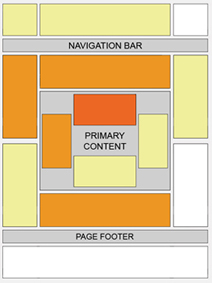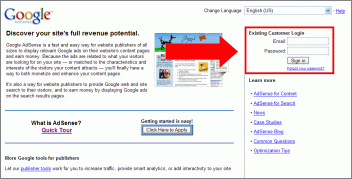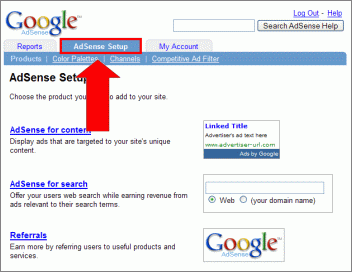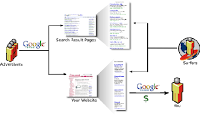Why Advertise in Blogs?
Blogs sell !!!!!!!!!!!!!! And advertisers have grown aware of this. Real blogs, that is. Blogs may be either gold or nothing for advertisers, depending on their popularity.
The first condition for a blog to become popular is to address a large mass of people by topic and rich content.
The second is dynamism. A reason why advertisers love so much blogs is that they have a large area of exposure by blogs' ever-growing, fresh content.
The third is good promotion. Feeds (RSS or Atom) spread out the word. These are the drivers of the system and make a difference from stalled content wesbsites.
Genuine blogs have what it takes to sell. Real bloggers become opinion-makers and niche influencers. (Here lies the superiority of blogs towards forums):
* They rejoice credibility from readers -- popular blogs gain the status of trusted source.
* They have the power of persuasion -- bloggers use argument and evidence to sustain their point of view. Recommendations from them are more likely to be granted attention.
* They impel to action -- blogs relate emotionally to the reader and involve the reader.
The other side of the coin is that blogging could be deturned by the purpose of making money, thus content could suffer. How far can one go in chosing a topic: just for the sake of blogging or to match an advertising target?
Just as not all blogs are good for advertisers, not all advertising is for blogs. Ads that are interesting, thought-provoking work for blogs. Blog advertising is less for entrenched brands and more for new products or new launches.
It’s amazing how many ideas come from the chats I have with other bloggers, co-workers, readers, friends and family both in real life and via IM or email.
Reader Questions - related to this is responding to questions asked by readersReader Comments - similarly, the comments left on your blog can be a treasure trove of ideas for future postsOther Blogs - like this post, I find the writing of others often stimulates posts that build on, extend or bounce off their ideas. Don’t forget to dig around in other people’s archives also as it isn’t only current posts that are places where you’ll get ideas. Of course always give credit to the source of your ideas.Books, Newspapers, Magazines - I’m increasingly finding inspiration in offline sources of informationMad Ideas - ever been laying in bed at night and get a crazy idea! I don’t just chuckle to myself when they come - I get up and write them down. It’s amazing how many of them end up being key posts for me later.Experience - a fairly large proportion of my post ideas come directly out of an experience that I’m having on the topic. Problems, achievements, challenges and mistakes are often the best source of useful posts as you’ll find readers relate well to them.Brainstorming - I take time out each week to specifically come up with ideas to post about. While most of my posts ‘just come to me’ through my day to day rhythm - I’m a big believer in working hard on story ideas also and have a folder permanently on my desktop filled with text documents that have little else in them except for a topic idea and perhaps a few jotted down notes - all to work on later.Archives - dig around in your own blog’s archives and you’ll be amazed at the opportunities that you’ll find. Look for half finished ideas, opportunities to update your ideas or even topics that your newer readers wouldn’t have seen before.Now how To Drive Traffic to Your Blog ?Learning the basicsFirst you need to grasp and understand that the Internet is a big place. Several billion web-pages, and often with very little time available to the end-user, they’ll use several techniques to find what they’re looking for.
SEOSearch? Standard engines like Google, Yahoo and Live are the most popular nowadays, and optimizing your site to be found easily, can be easy and hard based on many factors.
My best advice for someone starting out would be to start by building quality content for somebody to see, then progressing to “The Three Cs”. This way, you’ll get noticed by genuinely interested people, who’ll actively want to play a part in your site’s development, by giving you quality feedback on ways to improve, design and usability.
If you have a blog or a website that’s been going for several weeks, perhaps a month or two, and you’ve done “The Three Cs”, or at least some of them, would be to start focusing on building on your existing content, with fresh, interesting, relevant and unique content. Note I say ‘relevant’ and ‘unique’. This is important. There are so many splogs out there now-a-days, that people can quickly distinguish whether an article has been written by somebody or not, at least the majority of the time. Relevance too, like I said, is a key factor. If you have a very personal blog, then one day write something completely off-topic about a new type of golf club that comes out, people will start to wonder if you and your blog actually have an aim or a purpose, which is yet another vital thing to consider.
If you’re somebody with a very mature blog, that is several months or more old, you can now focus on the technical side of things, which is mainly down to the spiders. If you’ve been blogging this long, then if you’re not on your own domain, or hosting, I recommend it, as it allows for greater flexibility, design and SEO. Search engine optimization? Yep! A Google Sitemap can be stuck on your server for the Google-Bot and metatags can be added, which let you pre-define information about your page automatically, such as the author, a description, keywords and feed information. This also makes usability easier for feed-ready browsers like Firefox and Internet Explorer 7. Tacky pre-set designs become a thing of the past too, and upgrading to Wordpress can be a smart move, as the developer community there will help you along the way with every aspect of your blog, from the writing itself, to the advanced functionality like widgets that are available, and the themes that are freely downloadable to customize your blog’s look. Of course you could always give design a go yourself as I did at Techzi.net - though admittedly I enlisted the help of two professional designers as well.So, what are these ‘C’s that I’ve been talking to you so much about anyway? Read on to find out…
- “Commenting on related blogs is probably the most effective strategy early on in the process. And responding to comments when people leave them on your blog (this encourages them to keep coming back).” And from Brody - “I visit other blogs in my niche, add them to my feed and participate in the discussion on their blogs via the comments. Writing interesting comments often gets people to click through to see your site.”
2. Join Forums - - “I’ve found that one very quick way to infuse readers to a new blog is to be active in discussion forums related to your blog topic. Locate posts that ask for help with something you are familiar with and share your experience.”
3. Write Effective Post Titles - - “Simple and to the point. The title should create an instant urge to read the entire post… But of course it should be related to the topic of your blog”
4. Interviews - - “One example being to interview fellow bloggers who are in the same niche as me. This has gone down well, and has been great for both myself and the interviewee as traffic flows between us.”
5. Persist - - “Persistence is key. After starting up a new blog last month and letting go of another this month, I notice that traffic (quality traffic) doesn’t happen over night. On my last site, I think it took 6 months before ASK.com found me.”
6. Connect with Local Bloggers - “The other thing I’ve been doing just recently is connecting up with other bloggers in my city and the neighboring towns. We’ve got something of a link exchange going and a nice side-effect to this is that I/we have discovered that there are quite a few more bloggers and/or website authors in the area than ever expected.”
7. Give Away Free Stuff - - “I’ve had some success with giving away free stuff, like free templates for WordPress. It doesn’t give me lot of new readers, because my blog is written in Norwegian, but the templates give lots and lots of new links to the blog, giving it a much better pagerank in Google, which in turn should mean more readers from search-engines.”
8. Be Opinionated - - “Be opinionated, but encourage opposing viewpoints in the comments. Opinionated makes you interesting - encouraging other perspectives makes you essential.”
9. Ask Questions of Other Bloggers - -“Ask questions of other moderately successful bloggers and try to network. If you shoot too high, you’ll often get blown off because these people have so much stuff to read and deal with.”
10. Use Trackbacks - - “Sending highly creative and penetrating trackbacks about a blogger’s original post.”
11. Advertise -- “Buy advertising space on related websites.”
12. Educate Readers about RSS - “With the most recent blog I launched I created a page in WordPress called Feeds which not only has the RSS icon on it but a description of what a “feed” is and what are some of the most common ways to subscribe and use feeds, mostly pulled from a CC article.”
13. Offline Promotion - - “Talk to friends, family and coworkers about them… you’d be surprised how much the traditional way of “networking” really does work…. also Business cards, depending which blog I’ll post on a community board at a grocery store.
14. Search Engine Optimization - - “Properly optimizing my blog has been a big boost to my readership. Once I figured out how to play around with SEO I started getting a regular 25-35% of my hits from Google.”
15. Quality Content (mentioned by many) - writes - “Posting only quality content.. obviously! Better posts are discussed more, increasing both the number of comments and references in other blogs.”
16. Blog Carnivals - writes -“submitting posts to Blog Carnivals”
17. Memes - writes - “I’ve picked up a handful of wonderful friends and readers through initiating the “Thursday Thirteen”. Yeah, a meme. Bloggers want to know about bloggers, not just the business aspect of it but the *person* writing the blog. Reading a quick list of “getting to know me” type tidbits gives me instant inside information on whether or not I will become a regular visitor. Some participants have used it solely to gain business, but frankly I think that turns people away. People are interested in people first, and what they do second. It works.”
18. Frequent Posting - writes - “I also try to post frequently. I find that the more I post, the more readers I have. The less comments, but the more readers.”
19. Guest Bloggers - “I invite other bloggers to guest blog and allow always one link back to their site. I have 3 active guest authors … and in return they link to my site from time to time.”
20. Get Links from Other Blogs - “Getting mentioned on other sites and blogs in the same niche, I think, has been the best way to get a readership who keeps returning to a blog. Make contact with other bloggers in yoru niche via comments, email, AIM, skype, homing pigeons - whatever.”
21. Newsletters - writes - “The Zookoda newsletter provides nice spikes and people tend to forward the newsletter to their friends.”
22. Social Networks - “Submit your story to Digg and reddit and, regardless of whether it makes the front page or not, you get 50-100 free hits. The easiest way to generate quick exposure. Failing that, comment frequently on blogs that you like. With any luck, the blog author will want to find out more about you, follow the link to your blog, and perhaps write a post referencing one of your posts.”
23. Pitch Your Posts - - “I view other bloggers as a PR pros view journalists working in traditional media. I reach out to bloggers using tactics successfully employed in the world of professional media relations. For instance, I “pitch” specific posts that they might find adds value to topics they are writing about. I also send email introducing them to my blog, but only if there’s a good fit between my blog and theirs. The key is to be very selective in approaching the “media gatekeeper”–just as successful and smart media relations people do.”
APPLY HERE :https://www.google.com/adsense/
Sign up now & make money!Call any phone anywhere Free!Send SMS anywhere in India Free!Search Profiles :Start Chatting within secondsWin cash Rs.5,000Earn Money Online! No Registration Fees. Guaranteed Payments. Unlimited Music, Movies, TV Shows Downloads.























